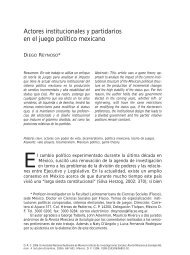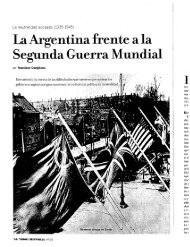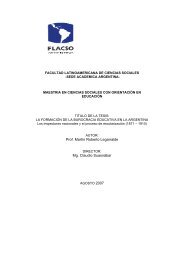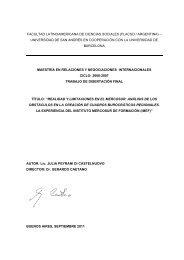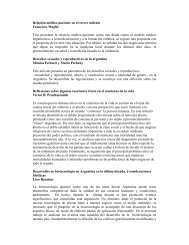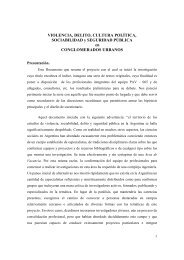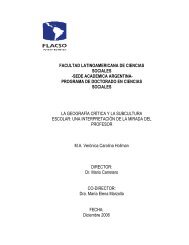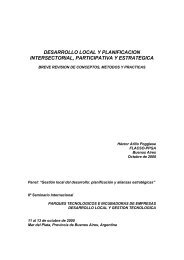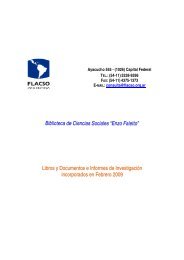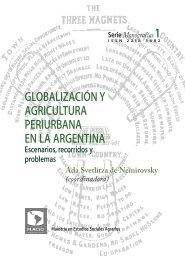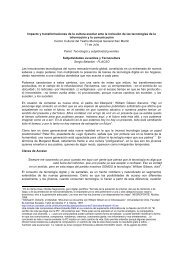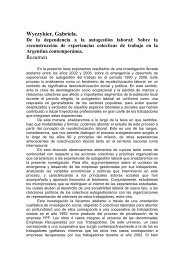Mercedes Botto Andrea Carla Bianculli - Flacso
Mercedes Botto Andrea Carla Bianculli - Flacso
Mercedes Botto Andrea Carla Bianculli - Flacso
Create successful ePaper yourself
Turn your PDF publications into a flip-book with our unique Google optimized e-Paper software.
When social research influences the decisional process, this is based on the fact that it is just<br />
another knowledge or area of expertise. Moreover, this influence takes place in decision-making<br />
arenas already informed by other kinds of previous local knowledge – such as partial information,<br />
anecdotes, and accumulated experiences and practices, among others – used by the wide range of<br />
players involved in the process as soon as they implement their own strategies. Within this context,<br />
social scientific knowledge can have some limited influence or impact in the decision-making<br />
process only by establishing a competition with previously provided local knowledge and<br />
information. In most cases, the influence of research may lead to the construction of a framework<br />
consisting of empirical generalizations and ideas that can then be absorbed by policymakers in a<br />
rather unconscious manner.<br />
As opposed to the first approach, this second paradigm appears to be more realistic. Based on the<br />
idea that knowledge and academia diversify rapidly, it argues that it is difficult to identify “social<br />
researchers” as a clear and homogeneous social and professional group. Their specificity is not<br />
given by their belonging to a particular institution – such as university. Instead, it is their experience<br />
and technical knowledge on certain issues that determines their specific character2. In terms of the scope of this research, the definition of three concepts – academia, policy change,<br />
and research influence – turns out to be of importance. First, we will focus on the influence that<br />
local academia exercise on trade policy decisions. Our analysis will revolve around the production –<br />
knowledge – of local academia, rather than on the ideas and findings produced by epistemic<br />
communities as defined by Haas [1992]. Even if “academia” may be a rather elusive concept to<br />
define, within this paper we will assume academia as an actor, whose peculiarity is the production<br />
of knowledge according to rules, evidence, and positive – empirical – and scientific criteria – based on<br />
measuring and contrasting.<br />
Our general working definition is based on a broad characterization of academia, rather than on the<br />
idea that academia belongs or is circumscribed to a specific ambit or production place, such as<br />
university, since we are aware that this type of knowledge is currently quite dispersed across diverse<br />
ambits, and academics are increasingly being appointed as service providers by other actors and<br />
institutions. Thus, we acknowledge the fact that in order to apprehend the concept of academia we<br />
must explicit the main changes in terms of its area of action and activities. As far as the area of<br />
action is concerned, and in the context of trade policies, academics can now be found within the<br />
so-called think-tanks and as consultants and experts in the broader social and political community:<br />
Ministries of Economy and Foreign Affairs and different public agencies, parliament, business<br />
sectors, national and international non-governmental organizations (NGOs), and international<br />
organizations, among others. In terms of their activities, the traditional characterization of social<br />
research seems inadequate in face of the new challenges policy-making imposes today. In this sense,<br />
Reich’s concept of “symbolic-analytical services” [1991] turns out to be of great utility given that<br />
this includes a whole set of activities regarding the identification, solution, and arbitration of<br />
material problems and disputes by means of the manipulation of knowledge.<br />
2 This is based on the expression that the expert only exists when placed in an “expertise” situation [Restier-<br />
Melleray, 1990: 546].<br />
6


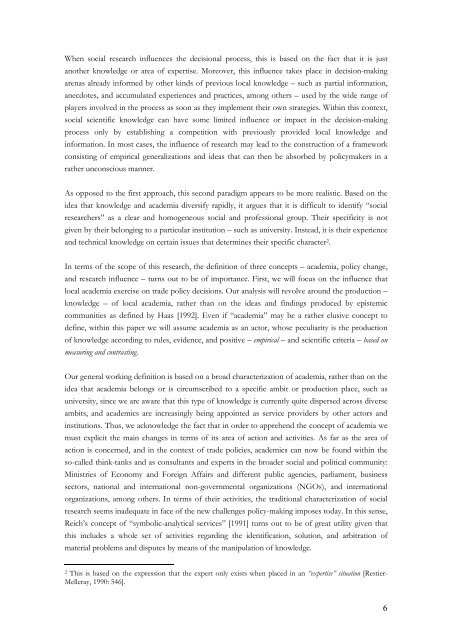
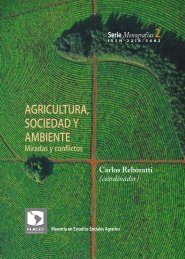
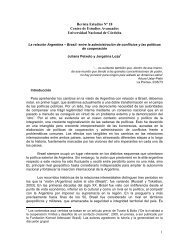
![[P] Disertacion.Melisa.Galvano.pdf - Flacso](https://img.yumpu.com/14596629/1/184x260/p-disertacionmelisagalvanopdf-flacso.jpg?quality=85)
